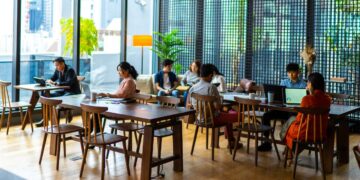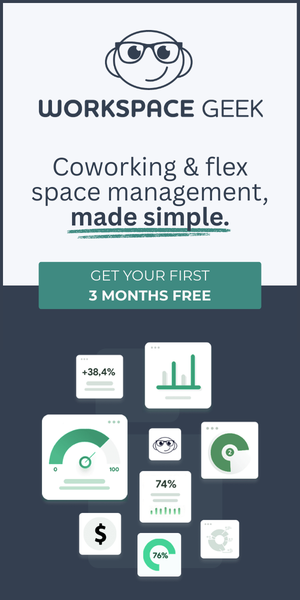- The current situation is preventing young workers from learning and developing valuable workplace skills.
- Companies are now shifting their focus to a human-centric workplace, which offers valuable opportunities for flex space operators and landlords.
- Jonathan Weinbrenn, managing director of BE.Spoke, discusses the corporate trends they are seeing and how this is creating positive change for working people.
Remember your first office-based job?
Can you imagine your first day taking place at home, working from the kitchen table, having inductions with your new colleagues over the phone?
This is the reality for many young people who are starting work or switching jobs during the pandemic.
“For those people who haven’t entered the workplace yet, I worry about that lack of human skills development that we naturally get from being in a work environment,” said Jon Weinbrenn, managing director of BE.Spoke.
“I wonder, how will they develop emotional intelligence? How will they develop skills around empathy, tolerance, and leadership? The office is almost an extension of the pillars of society and we just can’t recreate that at home, working alone.”
Research by Skillcast and YouGov (May 2020) found that workers under 35 have struggled with home-based work more than their over-55 colleagues, citing difficulties with motivation (59%) and loneliness (44%).
Flexible work is important. But equally important is the need to balance that flexibility with time spent learning and developing skills alongside other people in a face-to-face environment.
This includes learning soft skills such as time management, coping with deadlines, carrying out research, communicating with customers, and so on.
“I acknowledge that change is happening, and some of that change is positive. But for young people entering the workforce, I believe they’re craving that environment where they sit with more experienced colleagues who can mentor them and teach them the ropes.”
Middle ground that benefits everyone
Weinbrenn notes that this realisation is leading a lot of companies to soften their approach to the idea of a 100% remote operation. So is hybrid the answer?
He believes that the solution lies in finding a middle ground that benefits everyone. This may be a hybrid approach, but hybrid doesn’t necessarily mean where you work, it also means how and when you work.
“There’s no right answer, because individuals and companies all look at this differently. I speak with various large and multinational organisations on a weekly basis, and they all have very different views and requirements.
“I believe that flexibility is the answer.”
Some people naturally prefer the buzz and bustle of a social, lively workplace, and working from home is particularly challenging for them. However, others, particularly those with introvert tendencies, thrive in a quiet home-like environment.
The current situation is enabling employers to see for themselves how their workforce copes with remote work, and to consider ways to adapt the workplace to emulate those facets that work well or produce the best results.
Are we finally approaching an era where the needs of every individual and personality will be reflected in the workplace?
“That nice quiet, reflection space doesn’t have to be at home — it can be in the office too,” said Weinbrenn. “This situation is prompting the workspace sector to think about how to accommodate different character traits. It’s all about getting the balance right.”
Companies are shifting focus to their people
The shift towards a more human-centric workplace has been slowly gaining traction over recent years, and the pandemic is now accelerating this change.
Research conducted by JLL (November 2020) found that while employees value flexible work and the opportunity to work from home part-time, they “still retain a strong affinity for the office, especially as it relates to providing a sense of community and belonging”.
Furthermore, the study found that 70% of employees believe an office environment is more conducive to team building and management support.
Weinbrenn is seeing this shift first-hand from the companies that BE.Spoke work with.
BE.Spoke typically partners with larger companies and corporates, many of whom would typically opt for a traditional, functional workplace. Now, those same companies are actively shifting their focus to their people.
“They could have a floor with rows of desks. But now they’re looking at creating human-centric spaces that better reflect the individual. They’re really embracing significant change and they’re doing it because they want to improve their employees’ experiences.”
Weinbrenn notes that some companies are decreasing their space overall, which is reflective of hybrid work models. However, the space they require is more considered; there is greater focus on how their staff will engage and interact with the space.
This is an exciting opportunity for the flex space sector, particularly as operators are already closely engaged with their members and, for those with the right space, are able to react to these needs relatively quickly.
‘Win win’ opportunity to partner with landlords
For operators who don’t have the right space, there are opportunities to work with landlords — who, according to Weinbrenn — are actively seeking partnerships with proven flex space operators.
“Right now the commercial property market is in dire straits. Landlords need to be more innovative and creative in how they address this problem. A natural route to market is to partner with a flex operator who is skilled at delivering, marketing, filling, and running a space.
“Since the start of the pandemic, the appetite from landlords to engage with us is almost insatiable, it’s going through the roof in terms of enquiries. This is one of the most powerful and most demonstrable things I’ve seen.”
It is a two-fold process: first, landlords believe that having an amenity provision of flexible space within their building enables them to introduce and develop longer term customers. Second, the space provides their existing long-term clients with a valuable amenity.
“It really does create that natural ecosystem that is in demand now, like a mini village within a building.
“The BE Group of companies has seen a massive increase in landlords who want to work with us. It’s really tangible, and we’re under offer on a range of new opportunities. We’re looking at locations we’ve never looked at before and endorsing a more evenly spread offering across the country, and further afield.”
“Now the world has woken up to the need to think differently, and there are lots of opportunities for the flex industry,” he added. “I’m convinced occupiers and customers will want these solutions long term. It’s very exciting.”


















